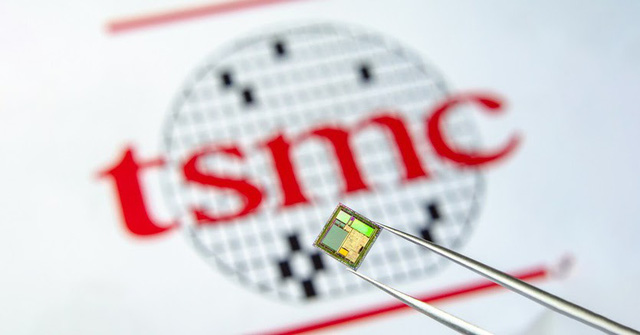Apple’s largest chip manufacturing partner confirms the sad news about iPhone 14
- Tram Ho
According to Phone Arena, TSMC and Apple had hoped to be able to ship chips manufactured using the 3 nm process to equip the iPhone 14 series, which is expected to be released in the second half of 2022. However, this may not work. may not become a reality.
TSMC is the world’s largest semiconductor manufacturing company with customers being tech giants such as Apple, Qualcomm and Nvidia. TrendForce data shows that TSMC accounted for 54% of total global semiconductor sales in 2020. The company has manufactured chips on the 5 nm process for Apple such as Apple A14 Bionic (present on iPhone 12) or M1 (available on iPhone 12). appear on the MacBook Air, MacBook Pro, and even the new iPad Pro).

TSMC is a major chip manufacturing partner of Apple. Photo: Phone Arena.
In 2019, Apple introduced iPhone 11, using Apple A13 Bionic chip, developed on 7 nm process with 8.5 billion transistors. However, this number is quite low compared to the 11.8 billion transistors on the Apple A14 Bionic chip or the 16 billion transistors on the M1 chip. As a general rule, the larger the number of transistors, the more powerful and energy-efficient the chip is.
In early August, Digitimes page revealed that the iPhone 14 series (possibly launched in 2022) will be equipped with Apple A16 Bionic chip, manufactured based on TSMC’s 3 nm process. “TSMC is in the process of transferring manufacturing technology with a mass 3 nm process in the second half of 2022 for Apple devices such as iPhones or Mac computers,” writes Digitime.
However, according to Seeking Alpha, TSMC has confirmed the delay in the production of 3 nm process chips. Instead, TSMC is expected to manufacture the A16 Bionic chip using the 4 nm process. This means that the iPhone 2022 models will not bring as many performance and power consumption improvements as originally hoped.

iPhone 14 may not be equipped with a chip developed on the 3 nm process. Photo: Platform Decentral.
Apple is also said to be planning to produce chips based on the 4 nm process for the M2. This is the successor to the Apple Silicon M1 chip used on Macs and iPad Pro (2021).
This delay could give Samsung the opportunity to become the first company to ship 3 nm chips instead of TSMC. That is very important in the battle of the smartphone industry. It is likely that Samsung’s Galaxy S22 model will become the first smartphone with a 3 nm chip instead of the iPhone 14 models.
Last year, Apple introduced the iPhone 12 model. This is the first smartphone model equipped with a chipset based on the 5 nm process. After that, its iPad Air 2020 line also owns the same configuration.
Both TSMC and Samsung are considered to be the leaders in chip manufacturing in the world with a 2 nm chip development roadmap. Earlier this year, IBM introduced the first 2 nm chip using the Gate-All-Around (GAA) nanoarchitecture that could allow 50 billion transistors to be placed inside the chip.
However, IBM thinks it will commercialize the 2nm chip in the next few years. This year, the company plans to produce and commercialize the chip line with the 7 nm process.
“Using 2nm chips can do wonders in terms of battery life on smartphones. Specifically, 2nm processors offer up to four times more battery savings than devices with 7nm chips such as devices like 7nm. iPhone 11, Samsung Galaxy S10 or Google Pixel 5. This also means that with a single charge, you can use the device for about 4 days,” said an IBM representative.
Source : Genk
